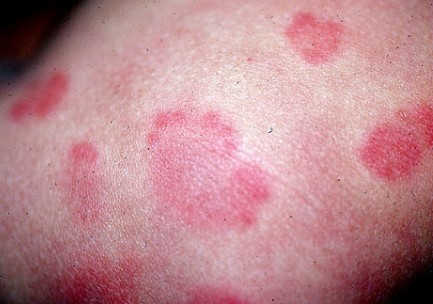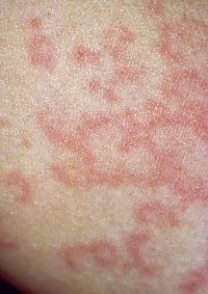
We’d like to tell you about your options for urticaria hives treatment. First, though, let’s look at the differences between two types of hives, urticaria, and angioedema.
Urticaria – Urticaria is just a medical name for hives that appear on the surface of the skin. Hives can be caused by all sorts of things, including allergic reactions to food or medications, allergic reactions to things in the environment like pollen or mold, infections or viruses, too much exposure to sunlight, excessive sweating, extremes in temperatures, or even stress. Sometimes it’s difficult to know what causes it. Hives are usually very itchy and can cause quite a bit of discomfort, even keeping you awake at night.
Angioedema – Angioedema is a medical name for swelling or hives that occur in deeper layers of the skin. Angioedema often occurs around the eyes and lips. In some cases, it causes swelling in the throat, which can be life-threatening in severe cases. If you develop hives and have trouble breathing or swallowing, you need to get immediate medical treatment. Have someone drive you to the nearest emergency room (don’t try to drive yourself because you might pass out while driving) or call 911 right away. Doctors or emergency medical technicians can give you an injection of epinephrine, which should reverse the swelling quickly.
Urticaria Hives Treatment Options

Urticaria often goes away on its own, without any treatment, and while angioedema can be life-threatening in some cases, urticaria is usually not dangerous. Since it can be very uncomfortable, though, people often want treatment for the condition. There are a number of options for urticaria hives treatment.
Natural remedies – There are a number of natural remedies people use for hives. Baking soda is a popular home remedy, either added to bathwater or mixed with water to form a paste and applied to the affected area. Oatmeal baths are another commonly-used natural remedy; a cup or so of oatmeal added to bathwater can relieve the itching of hives. You can read more about home remedies for hives here.
Antihistamines – Antihistamines are often used to treat urticaria. They are available over the counter (products like Benadryl and Zyrtec) or by prescription. These medications relieve the symptoms of hives, including itching, swelling, and redness. They are usually effective but can cause side effects, including drowsiness, dizziness, blurred vision, tremors, and poor coordination. Use care when driving or operating any kind of machinery if you take antihistamines.
Corticosteroids – Corticosteroids are sometimes used to treat hives if antihistamines don’t do the job on their own. Antihistamines are usually prescribed first because corticosteroids carry a greater risk of side effects, including anxiety, irritability, trouble sleeping, depression, dizziness, and nausea. They are usually only prescribed for short periods of time when necessary because long-term use can also cause weight gain and the growth of unwanted facial hair in women.
Other medications – There are other medications doctors can prescribe for urticaria, including other anti-inflammatory drugs and immune system drugs. These are usually only used when antihistamines and corticosteroids don’t provide adequate relief or can’t be used for some reason. In addition, antibiotics, antiviral drugs, or other medications may be needed in order to treat the cause of hives in some cases.
Talk to your health care provider if you have questions about the best way to treat your hives.
Our Favorite Skin Hives Treatment
Our favorite urticaria hives treatment is a natural homeopathic remedy called OxyHives. We like it because it’s available without a prescription, it’s affordable, and it works quickly to relieve itching and discomfort. Since it’s made from natural ingredients, it shouldn’t cause drowsiness or other unwanted side effects like antihistamines or corticosteroids often do. To learn more and find out if OxyHives might be right for you, just follow the link.
